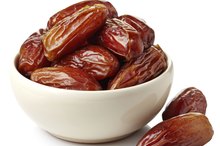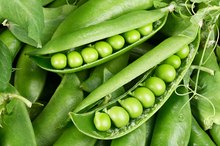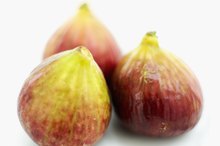What does fact checked mean?
At Healthfully, we strive to deliver objective content that is accurate and up-to-date. Our team periodically reviews articles in order to ensure content quality. The sources cited below consist of evidence from peer-reviewed journals, prominent medical organizations, academic associations, and government data.
- MayoClinic.com; Dietary Fiber: Essential for a Healthy Diet; November 2009
- Linus Pauling Institute Micronutrient Information Center; Glycemic Index and Glycemic Load; Jane Higdon; December 2005
The information contained on this site is for informational purposes only, and should not be used as a substitute for the advice of a professional health care provider. Please check with the appropriate physician regarding health questions and concerns. Although we strive to deliver accurate and up-to-date information, no guarantee to that effect is made.
Nutrition in Organic Black Mission Figs
Figs are a nutrient-dense choice for snacks or as ingredients in baking or cooking recipes. Organic Black Mission figs have been certified by the U.S. Department of Agriculture as part of the National Organic Program. They are grown without certain pesticides, but they are not necessarily more nutritious than regular black figs. As with most foods, the best approach is to include figs in moderation as part of an overall balanced diet.
Tips
Organic Black Mission Figs has 300 Calories and 2.50 g of Protein per 100 gram serving according to the nutrition facts provided by the USDA Food Composition Database.
Nutritional Overview
A serving of organic Black Mission figs is one-third of a cup of dried figs 1. The serving has 110 calories, 0 grams fat, 1 gram protein and 26 grams of total carbohydrates. Black Mission figs have 240 mg potassium, which is a nutrient essential for regulating blood pressure, according to the 2010 Dietary Guidelines from the U.S. Department of Health and Human Services 4. They have 6 percent of the daily value for calcium and for iron.
Dietary Fiber
How Many Calories in Carrot Sticks?
Learn More
A serving of organic Black Mission figs has 5 grams dietary fiber, or 20 percent of the daily value. Fiber lowers your cholesterol and may help control your blood sugar. Dietary fiber comes from the parts of plant foods your body cannot digest; other good sources include many fruits and vegetables, whole grains, beans and nuts. Be sure to increase your intake of dietary fiber only gradually and drink plenty of water to reduce your risk for side effects such as cramping.
- A serving of organic Black Mission figs has 5 grams dietary fiber, or 20 percent of the daily value.
- Be sure to increase your intake of dietary fiber only gradually and drink plenty of water to reduce your risk for side effects such as cramping.
Sugars
Most dried fruit is high in sugar, and Black Mission figs have 20 grams of natural sugars in one-third of a cup. Sugars are carbohydrates with 4 calories per gram, so the serving provides 80 calories from sugar, which is more than 70 percent of its 110 calories. An advantage of high-sugar foods is that they provide quick energy because the body is quick to release sugar into the bloodstream. A potential disadvantage is that blood sugar levels can fall sharply afterward, according to the Linus Pauling Institute Micronutrient Information Center 3.
- Most dried fruit is high in sugar, and Black Mission figs have 20 grams of natural sugars in one-third of a cup.
- Sugars are carbohydrates with 4 calories per gram, so the serving provides 80 calories from sugar, which is more than 70 percent of its 110 calories.
Sodium
List of High-Carb Foods to Avoid
Learn More
Figs are naturally sodium free, and organic Black Mission figs can be a healthy choice if you are following a low-sodium diet. A high-sodium diet can cause high blood pressure, or hypertension, which raises your risk for heart disease, stroke and kidney disease. Healthy adults should have no more than 2,300 milligrams sodium per day, and individuals on a low-sodium diet should not eat more than 1,500 milligrams.
Related Articles
References
- MyFitnessPal: Calories in Organic Made in Nature Gourmet Jumbo Black Mission Figs
- MayoClinic.com; Dietary Fiber: Essential for a Healthy Diet; November 2009
- Linus Pauling Institute Micronutrient Information Center; Glycemic Index and Glycemic Load; Jane Higdon; December 2005
- U.S. Department of Health and Human Services; Dietary Guidelines for Americans, 2010; January 2010
- Fig, raw. FoodData Central. U.S. Department of Agriculture. Published April 1, 2019.
- Figs, dried, uncooked. FoodData Central. U.S. Department of Agriculture. Published April 1, 2019.
- Arvaniti OS, Samaras Y, Gatidou G, Thomaidis NS, Stasinakis AS. Review on fresh and dried figs: Chemical analysis and occurrence of phytochemical compounds, antioxidant capacity and health effects. Food Res Int. 2019;119:244-267. doi: 10.1016/j.foodres.2019.01.055
- Antioxidants: In Depth. National Center for Complementary and Integrative Health. Updated November 2013.
- Jasmine R, Manikandan K, Karthikeyan. Evaluating the antioxidant and anticancer property of Ficus carica fruits. Afr J Biotech. 2015;14(7):634-641. doi:10.5897/AJB2014.13742
- Pourmasoumi M, et al. Comparison and assessment of flixweed and fig effects on irritable bowel syndrome with predominant constipation: A single-blind randomized clinical trial. Explore (NY). 2019;15(3):198-205. doi:10.1016/j.explore.2018.09.003
- Concerned About Constipation? National Institute on Aging. Updated December 01, 2013.
- Antico A, Zoccatelli G, Marcotulli C, Curioni A. Oral allergy syndrome to fig. Int Arch Allergy Immunol. 2003;131(2):138-42. doi:10.1159/000070929
- Jackfruit Anaphylaxis. American Academy of Allergy, Asthma, and Immunology. Published June 6, 2017.
- Reddy VB, Lerner EA. Plant cysteine proteases that evoke itch activate protease-activated receptors. Br J Dermatol. 2010;163(3):532–535. doi:10.1111/j.1365-2133.2010.09862.x
- Khan A.S. Figs and their medicinal value. Medicinally Important Trees. Springer, Cham. 2017; 235-253. doi:10.1007/978-3-319-56777-9_10
Writer Bio
Natalie Stein specializes in weight loss and sports nutrition. She is based in Los Angeles and is an assistant professor with the Program for Public Health at Michigan State University. Stein holds a master of science degree in nutrition and a master of public health degree from Michigan State University.









